
From The Vault - 1987

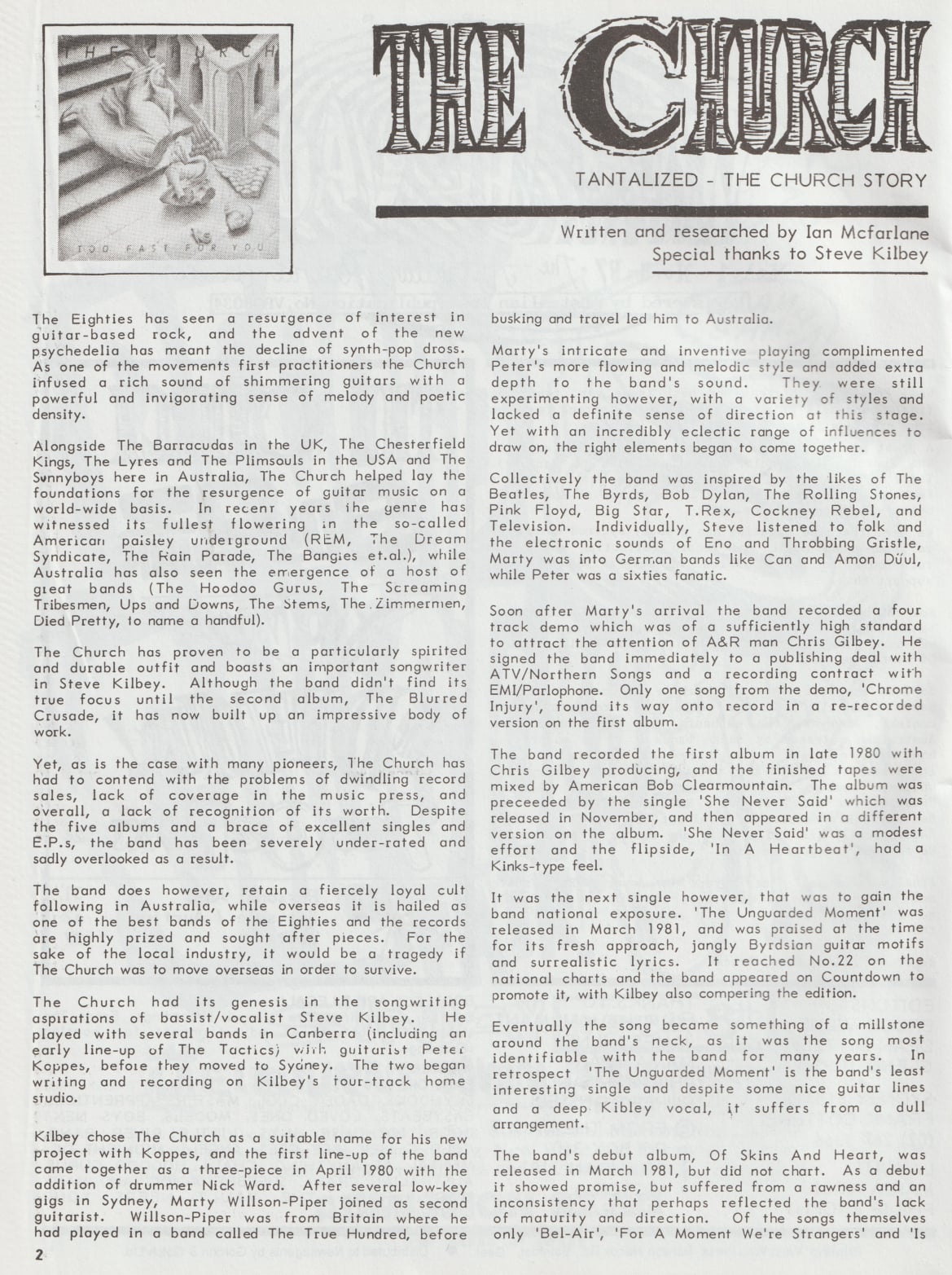
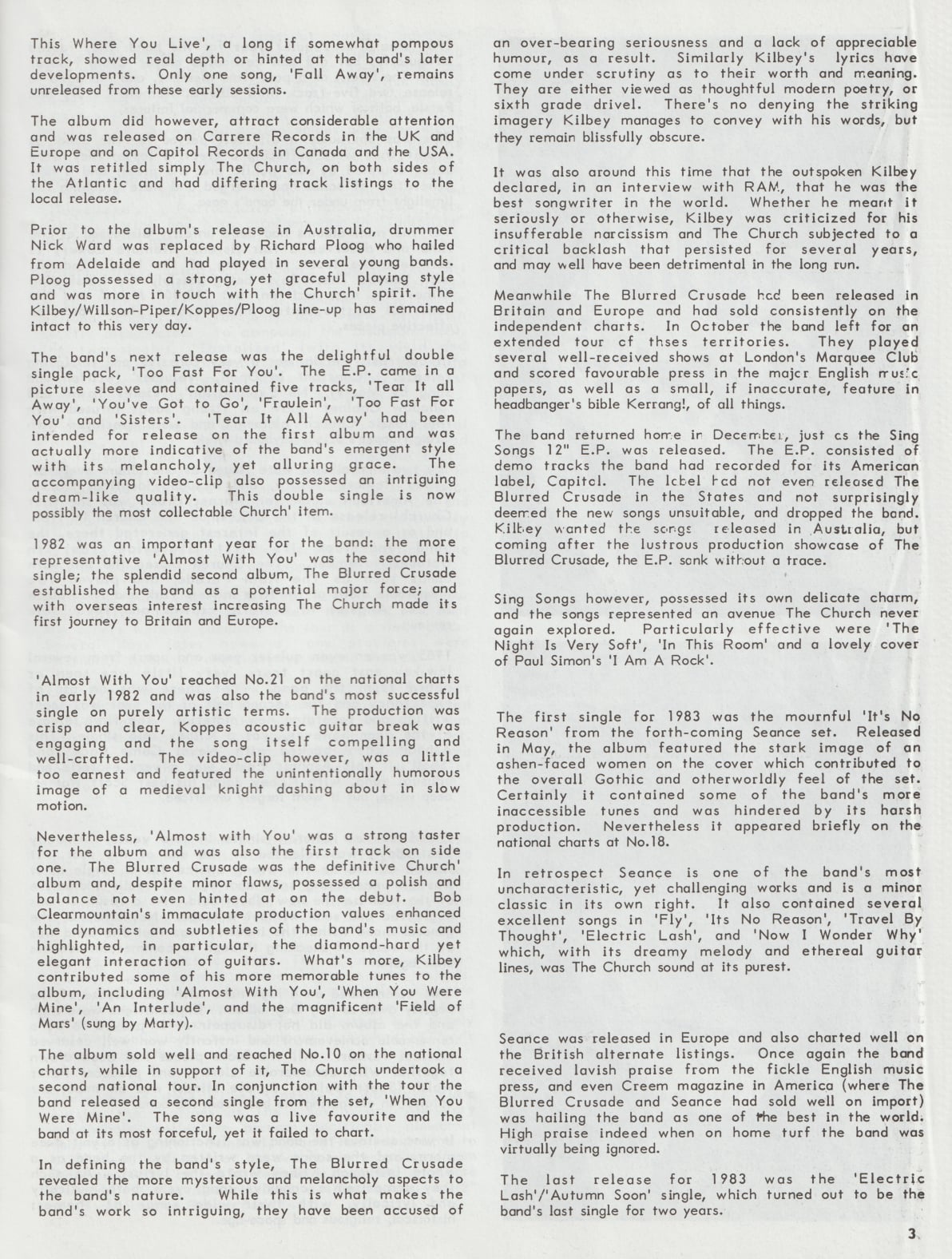
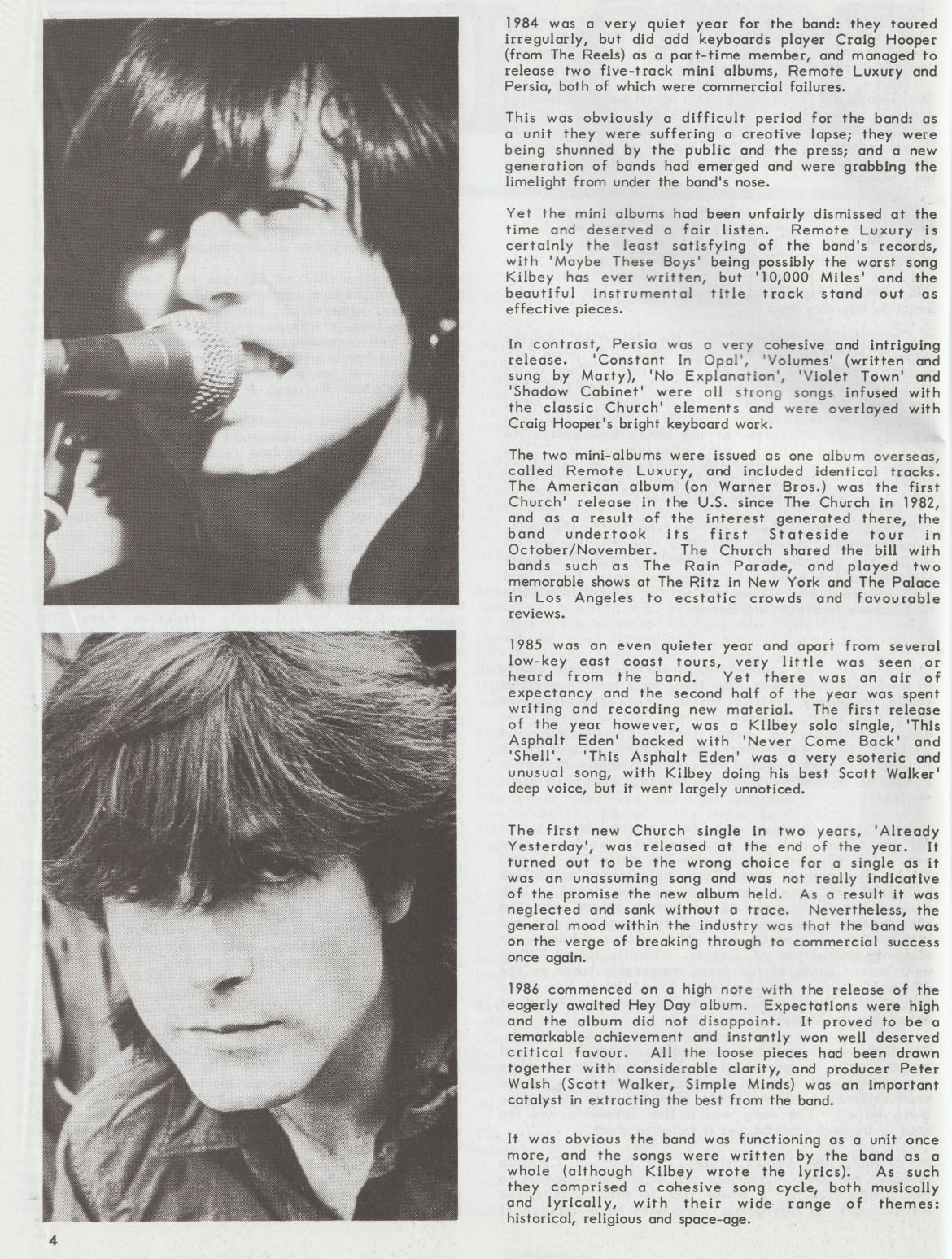
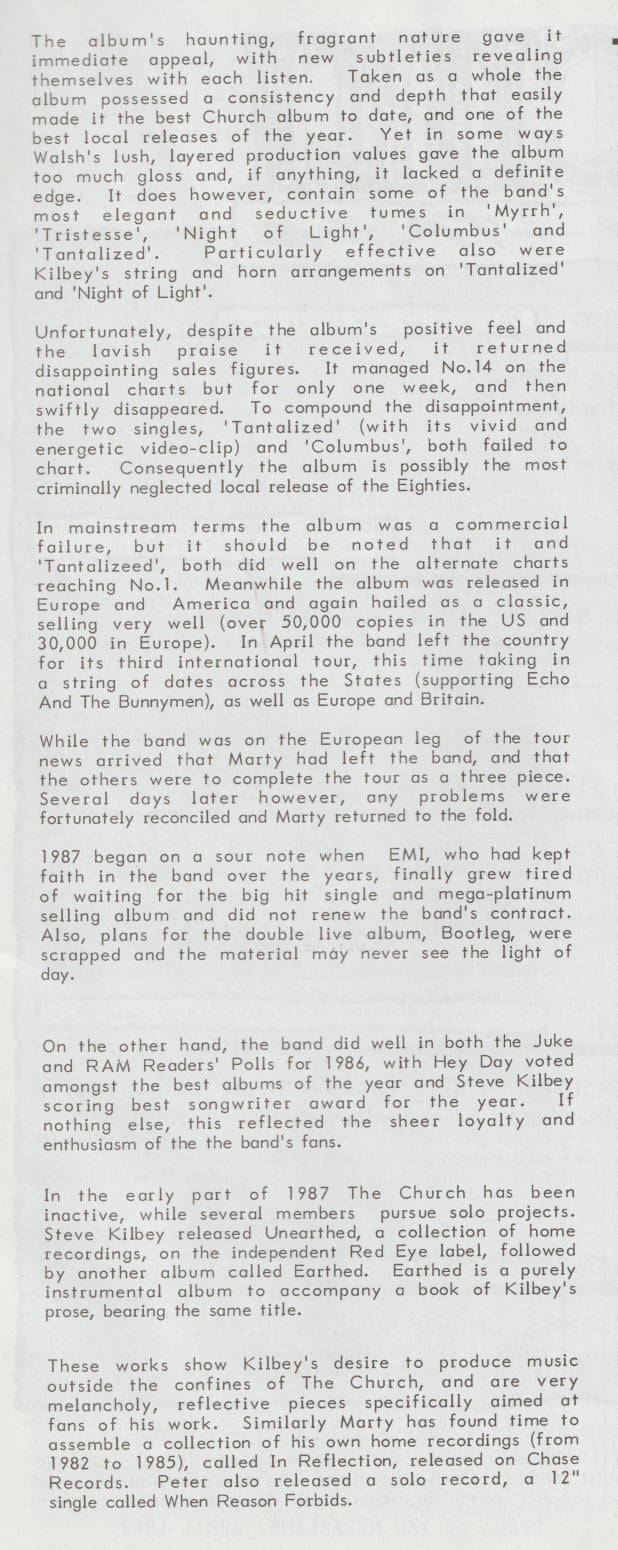
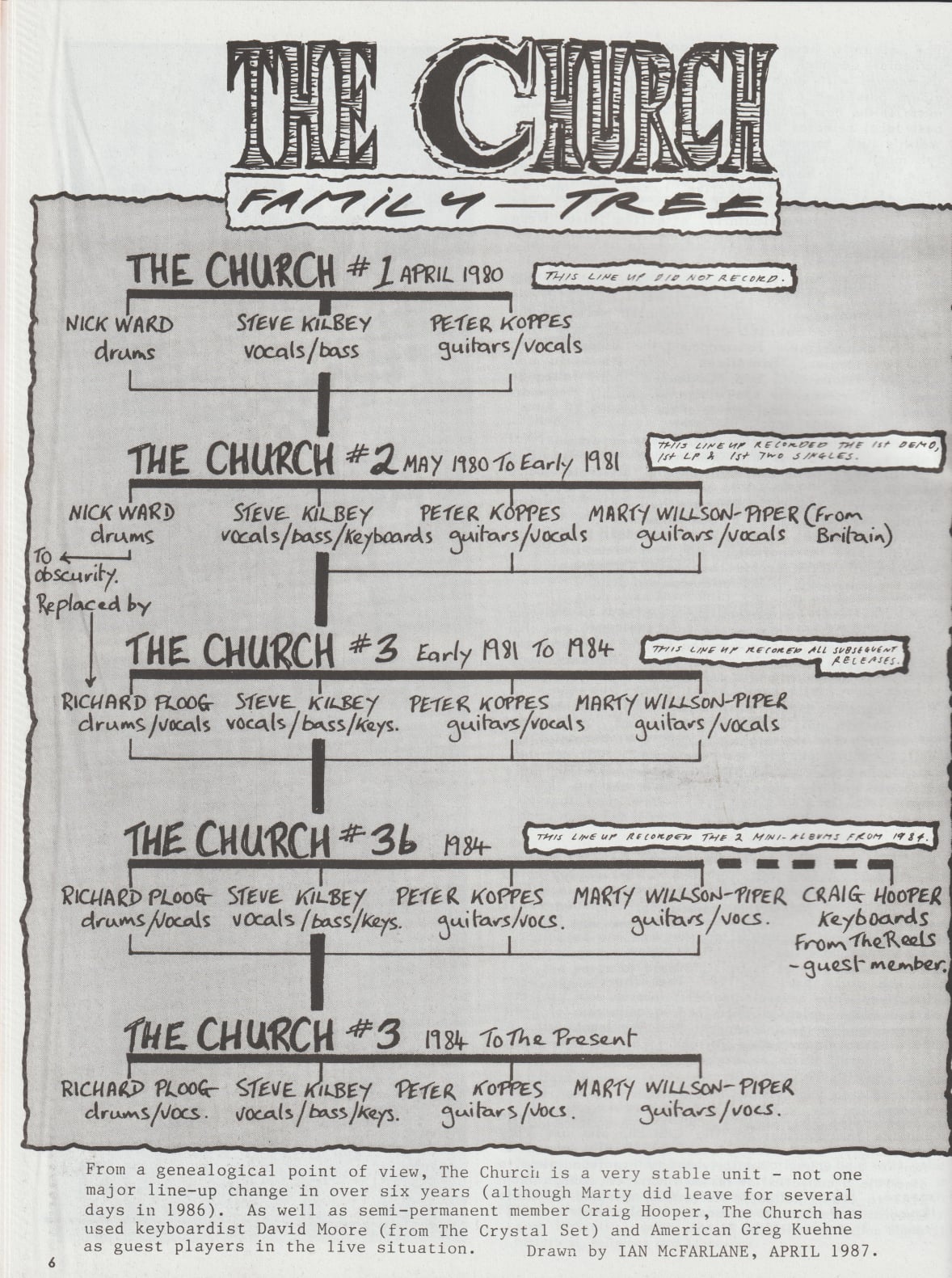

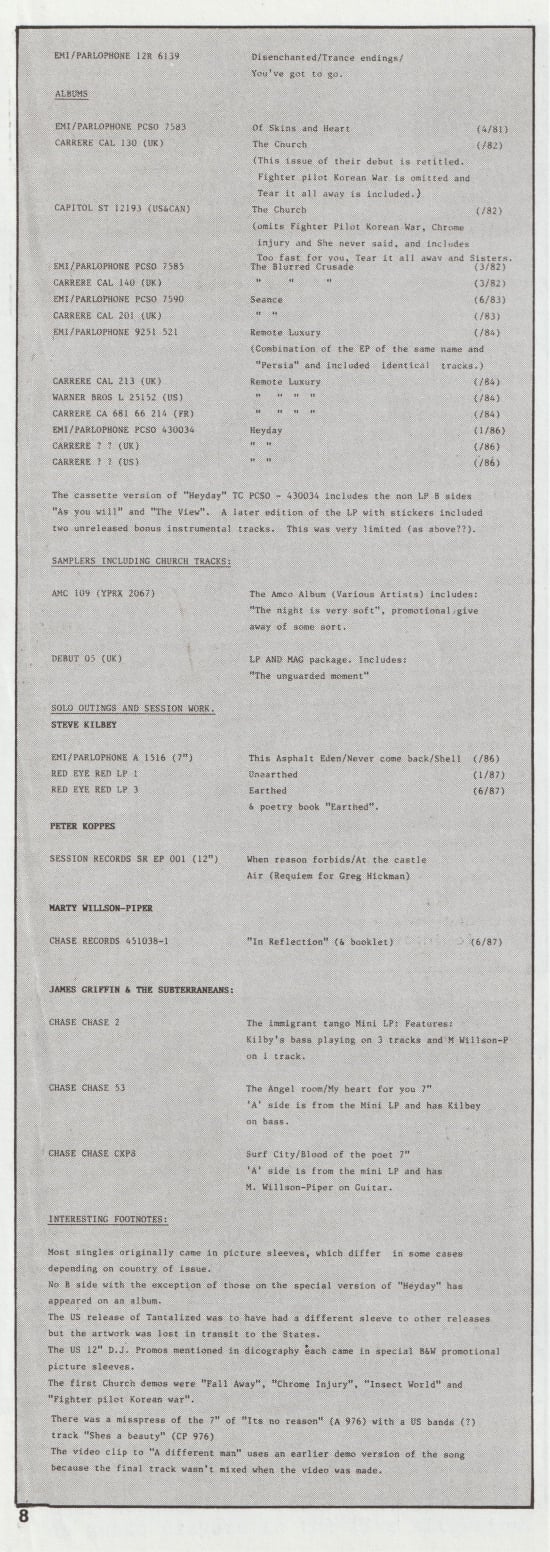

From The Vault - 1987








(transcription from the old Shadow Cabinet website)
***********************************************************
Source: From The Vault : Aus. Rec. Collector (?, AUS)
Issue: v1, n3 Date: 1987
Subject: Biography - The Church
***********************************************************
(this issue included a Flexi-disc of "Musk", no.FTV 3)
THE CHURCH TANTALIZED - THE CHURCH STORY
By Ian Mcfarlane Special thanks to Steve Kilbey.
The Eighties has seen a resurgence of interest in guitar-based rock, and the advent of the new psychedelia has meant the decline of synth-pop dross. As one of the movements first practitioners the Church infused a rich sound of shimmering guitars with a powerful and invigorating sense of melody and poetic density.
Alongside the Barracudas in the UK, The Chesterfield Kings, The Lyres and The Plimsouls in the USA and The Sunnyboys here in Australia, The Church helped lay the foundations for the resurgence of guitar music on a world-wide basis. In recent years the genre has witnessed its fullest flowering in the so-called American paisley underground (REM, The Dream Syndicate, The Rain Parade, The Bangles et.al.), while Australia has also seen the emergence of a host of great bands (The Hoodoo Gurus, The Screaming Tribesmen, Ups and Downs, The Stems, The Zimmermen, Died Pretty, to name a handful).
The Church has proven to be a particularly spirited and durable outfit and boasts an important songwriter in Steve Kilbey. Although the band didn't find it's true focus until the second album, The Blurred Crusade, it has now built up an impressive body of work.
Yes, as in the case with many pioneers, The Church has had to contend with the problems of dwindling record sales, lack of coverage in the music press, and overall, a lack of recognition of its worth. Despite the five albums and a brace of excellent singles and E.P.s, the band has been severely under-rated and sadly overlooked as a result.
The Band does however, retain a fiercely loyal cult following in Australia, while overseas it is hailed as one of the best bands of the Eighties and the records are highly prized and sought after pieces. For the sake of the local industry, it would be a tragedy if The Church was to move overseas in order to survive.
The Church had its genesis in the songwriting aspirations of bassist/vocalist Steve Kilbey. He played with several bands in Canberra (including an early line-up of The Tactics) with guitarist Peter Koppes, before they moved to Sydney. The two began writing and recording on Kilbey's four-track home studio.
Kilbey chose The Church as a suitable name for his new project with Koppes, and the first line-up of the band came together as a three-piece in April 1980 with the addition of drummer Nick Ward. After several low-key gigs in Sydney, Marty Wilson-Piper joined as second guitarist. Wilson-Piper was from britain where he played in a band called The True Hundred, before busking and travel led him to Australia.
Marty's intricate and inventive playing complemented Peter's more flowing and melodic style and added extra depth to the bands sound. They were still experimenting however, with a variety of styles and lacked a definite sense of direction at this stage. Yet with an incredibly electric range of influences to draw on, the right elements began to come together.
Collectively the band was inspired by the likes of The Beatles, The Byrds, Bob Dylan, The Rolling Stones, Pink Floyd, Big Star, T.Rex, Cockney Rebel, and Television. Individually, Steve listened to folk and the electric sounds of Eno and Throbbing Gristle, Marty was into German bands like Can and Amon Duul, while Peter was a sixties fanatic.
Soon after Marty's arrival the band recorded a four track demo which was of sufficiently high standard to attract the attention of A&R man Chris Gilbey. He signed the band immediately to a publishing deal with ATV/Northern Songs and a recording contract with EMI/Parlophone. Only one song from the demo, 'Chrome Injury', found its way onto record in a re-recorded version on the first album.
The band recorded the first album in late 1980 with Chris Gilbey producing, and the finished tapes were mixed by American Bob Clearmountain. The album was preceded by the single 'She Never Said' which was released in November, and then appeared in a different version on the album. 'She Never Said' was a modest effort and the flipside, 'In A Heartbeat', had a Kinks-type feel.
It was the next single however, that was to gain the band national exposure. 'The Unguarded Moment' was released in March 1981, and was praised at the time for it's fresh approach, jangly Byrdsian guitar motifs and surrealistic lyrics. It reached No. 22 on the national charts and the band appeared on Countdown to promote it, with Kilbey also compering the edition.
Eventually the song became something of a millstone around the band's neck, as it was the song most identifiable with the band for many years. In retrospect 'The Unguarded Moment' is the bands least interesting single and despite some nice guitar lines and a deep Kilbey vocal, it suffers from a dull arrangement.
The band's debut album, 'Of Skins And Heart', was released in March 1981, but did not chart. As a debut it showed promise, but suffered from a rawness and an inconsistency that perhaps reflected the band's lack of maturity and direction. Of the songs themselves only 'Bel-Air', 'For A Moment We're Strangers' and 'Is This Where You Live', a long if somewhat pompous track, showed real depth or hinted at the bands later developments. Only one song, 'Fall Away', remains unreleased from these early sessions.
The album did however, attract considerable attention and was released on Carrere Records in the UK and Europe and on Capitol Records in Canada and the USA. It was retitled simply The Church, on both sides of the Atlantic and had differing track listings to the local release.
Prior to the album's release in Australia, drummer Nick Ward was replaced by Richard Ploog who hailed from Adelaide and had played in several young bands. Ploog possessed a strong, yet graceful playing style and was more in touch with the Church's spirit. The Kilbey/Wilson-Piper/Koppes/Ploog line up has remained intact to this very day.
The band's next release was the delightful double single pack, 'Too Fast For You'. The E.P. came in a picture sleeve and contained five tracks, 'Tear It All Away', 'You've Got To Go', 'Fraulein', 'Too Fast For You', and 'Sisters'. 'Tear It All Away' had been intended for release on the first album and was actually more indicative of the band's emergent style with its melancholy, yet alluring grace. The accompanying video-clip also pressed an intriguing dream-like quality. This double single is now possibly the most collectable Church' item.
1982 was an important year for the band: the more representative 'Almost With You' was the second hit single; the splendid second album, 'The Blurred Crusade' established the band a potential major force; and with overseas interest increasing The Church made its first journey to Britain and Europe.
'Almost With You' reached No. 21 on the national charts in early 1982 and was also the bands most successful single on purely artistic terms. The production was crisp and clear, Koppes acoustic guitar break was engaging and the song itself compelling and well-crafted. The video clip however, was a little too earnest and featured the unintentionally humorous image of a medieval knight dashing about in slow motion.
Nevertheless, 'Almost With You was a strong taster for the album and was also the first track on side one.. 'The Blurred Crusade' was the definitive Church' album and, despite minor flaws, possessed a polish and balance not even hinted at on the debut. Bob Clearmoutain's immaculate production values enhanced the dynamics and subtleties of the band's music and highlighted, in particular, the diamond-hard yet elegant interaction of guitars. What's more, kilbey contributed some of his more memorable tunes to the album, including 'Almost With You', 'When You Were Mine', 'An Interlude', and the magnificent 'Field Of Mars' (sung by Marty).
The album sold well and reached No. 10 on the national charts, while in support of it, The Church undertook a second national tour. In conjunction with the tour the band released a second single from the set, 'When You Were Mine'. The song was a live favourite and the band at its most forceful, yet it failed to chart.
In defining the bands style, 'The Blurred Crusade' revealed the more mysterious and melancholy aspects to the bands nature. While this is what makes the band's work so intriguing, they have been accused of an over-bearing seriousness and a lack of appreciable humour, as a result. Similarly kilbey's lyrics have come under scrutiny as to their worth and meaning. They are either viewed as thoughtful modern poetry, or sixth grade drivel. There's no denying the striking imagery Kilbey manages to convey with his words, but they remain blissfully obscure.
It was also around this time that the outspoken Kilbey declared, in an interview with RAM, that he was the best songwriter in the world. Whether he meant it seriously or otherwise, Kilbey was criticised for his insufferable narcissism and The Church subjected to a critical backlash that persisted for several years, and may have well been detrimental in the long run.
Meanwhile 'The Blurred Crusade' had been released in Britain and Europe and had sold consistent on the independent charts. In October the band left for an extended tour of the territories. They played several well-received shows at London's Marquee Club and scored favourable press in the major English music papers, as well as small, if inaccurate, feature in headbanger's bible Kerrang!, of all things.
The band returned home in December, just as the 'Sing Songs' 12" E.P. was released. The E.P. consisted of demo tracks the band had recorded for its American label, Capitol. The label had not even released 'The Blurred Crusade' in the states and not surprisingly deemed the new songs unsuitable, and dropped the band. Kilbey wanted the songs released in Australia, but coming after the lustrous production showcase of 'The Blurred Crusade'', the E.P. sank without trace.
'Sing Songs' however, possessed its own delicate charm, and the songs represented an avenue The Church never again explored. Particularly effective were 'The Night Is Very Soft', 'In This Room' and a lovely cover of Paul Simon's 'I Am A Rock'.
The First single for 1983 was the mournful 'It's No Reason' from the forth-coming seance set. Released in May, the album featured the stark image of an ashen-faced women on the cover which contributed to the overall Gothic and otherworldly feel to the set. Certainly it contained some of the band's more inaccessible tunes and was hindered by its harsh production. Nevertheless it appeared briefly on the national charts at No. 18.
In retrospect Seance is one of the band's most uncharacteristic, yet challenging works and is a minor classic in its own right. It also contained several excellent songs in 'Fly', 'Its No Reason', 'Travel By Thought', 'Electric Lash', and 'Now I Wonder Why' which, with its dreamy melody and ethereal guitar lines, was The Church sound at its purest.
Seance was released in Europe and also charted well on the British alternate listings. Once again the band received lavish praise from the fickle English music press, and even Creem magazine in America (where 'The Blurred Crusade' and 'Seance' had sold well on import) was hailing the band as one of the best in the world. High praise indeed when on home turf the band was virtually being ignored.
The last release for 1983 was the 'Electric Lash/'Autumn Soon' single, which turned out to be the band's last single for two years.
1984 was a very quite year for the band: they toured irregularly, but did add keyboards player Craig Hooper (from The Reels) as a part-time member, and managed to release two five-track mini albums, 'Remote Luxury ' and 'Persia', both of which were commercial failures.
This was obviously a difficult period for the band: as a unit they were suffering a creative lapse; they were being shunned by the public and the press; and a new generation of bands had emerged and were grabbing the limelight from under the band's noses.
Yet the mini albums had been unfairly dismissed at the time and deserved a fair listen. 'Remote Luxury' is certainly the least satisfying of the band's records, with 'Maybe These Boys' being possibly the worst song Kilbey has ever written, but '10,000 Miles' and the beautiful instrumental title track stand out as effective pieces.
In contrast 'Persia' was a very cohesive and intriguing release. 'Constant In Opal', 'Volumes' (written and sung by Marty), 'No Explanation', 'Violet Town' and 'Shadow Cabinet' were all strong songs infused with the classic Church' elements and were overlayed with Craig Hooper's bright keyboard work.
The two mini-albums were issued as one album overseas, called remote luxury, and included identical tracks. The american album (on Warner Bros.) was the first Church release in the US since 'The Church' in 1982, and as a result of the interest generated there, the the band undertook its first stateside tour in October/November. The Church shared the bill with bands such as The Rain Parade, and played two memorable shows at the Ritz in New York and The Palace in Los Angeles to ecstatic crowds and favourable reviews.
1985 was an even quieter year and apart from several low-key east coast tours, very little was seen or heard from the band. Yet their was an air of expectancy and the second half of the year was spent writing and recording new material. The first release of the year however, was a kilbey solo single, 'This Asphalt Eden' backed with 'Never Come Back' and 'Shell'. 'This Asphalt Eden' was a very esoteric and unusual song, with Kilbey doing his very best Scott Walker' deep voice, but it went largely unnoticed.
The first new Church single in two years, 'Already Yesterday', was released at the end of the year. It turned out to be the wrong choice for a single as it was an unassuming song and was not really indicative of the promise the new album held. As a result it was neglected and sank without a trace. Nevertheless, the general mood within the industry was that the band was on the verge of breaking through to commercial success once again.
1986 commenced on a high note with the release of the eagerly awaited 'Heyday' album. Expectation were high and the album did not disappoint. It proved to be a remarkable achievement and instantly won well deserved critical favour. All the loose pieces had been drawn together with considerable clarity, and producer Peter Walsh (Scott Walker, Simple Minds) was an important catalyst in extracting the best from the band.
It was obvious the band was functioning as a unit once more, and the songs were written by the band as a whole (although Kilbey wrote the lyrics). As such they compromised a cohesive song cycle, both musically and lyrically, with there wide range of themes: historical, religious and space-age.
The album's haunting, fragrant nature gave it immediate appeal, with new subtleties revealing themselves with each listen. Taken as a whole the album possessed a consistency and depth that easily made it the best Church album to date, and one of the best local releases of the year. Yet in some ways Walsh's lush, layered production values gave the album too much gloss and, if anything, it lacked a definite edge. It does however, contain some of the band's most elegant and seductive tunes in 'Myrrh', 'Tristesse', 'Night of Light', 'Columbus' and 'Tantalized'. Particularly effective also were Kilbey's string arrangements on 'Tantalized' and 'Night Of Light'.
Unfortunately, despite the album's positive feel and the lavish praise it received, it returned disappointing sales figures. It managed No. 14 on the national charts but for only one week, and then swiftly disappeared. To compound the disappointment, the two singles, 'Tantalized' (with its vivid and energetic video-clip) and 'Columbus', both failed to chart. Consequently the album is possibly the most criminally neglected local release of the eighties.
In mainstream terms the album was a commercial failure, but it should be noted that it and 'Tantalized', both did well on alternate charts reaching No. 1. Meanwhile the album was released in Europe and America and again hailed as a classic, selling very well (over 50,000 copies in the US and 30,000 in Europe). In April the band left the country for its third international tour, this time taking in a string of dates across the states (supporting Echo And The Bunnymen), as well as Europe and Britain.
While the band was on the European leg of the tour news arrived that Marty had left the band, and that the others were to complete the tour as a three piece. Several days later however, any problems were fortunately reconciled and Marty returned to the fold.
1987 began on a sour note when EMI, who had kept faith in the band over the years, finally grew tired of waiting for the big hit single and mega-platinum selling album and did not renew the band's contract. Also, plans for the double live album, bootleg, were scrapped and the material may never see the light of day.
On the other hand, the band did well in both the Juke and RAM Readers' Polls for 1986, with 'Heyday' voted amongst the best albums of the year and Steve Kilbey scoring best songwriter award for the year. If nothing else, this reflected the sheer loyalty and enthusiasm of the band's fans.
In the early part of 1987 The church has been inactive, while several members pursue solo projects. Steve Kilbey released 'Unearthed', a collection of home recordings, on the independent Red Eye label, followed by another album called 'Earthed'. 'Earthed' is a purely instrumental album to accompany a book of Kilbey's prose, bearing the same title.
These works show Kilbey's desire to produce music outside the confines of The Church, and are very melancholy, reflective pieces specifically aimed at fans of his work. Similarly Marty has found time to assemble a collection of his own home recordings (from 1982 to 1985), called 'In Reflection', released on Chase Records. Peter also released a solo record, a 12" single called 'When Reason Forbids'.
In April it was announced that the band had signed a worldwide contract with Arista Records and a local lease deal with Mushroom Records. At the time of writing the band was in process of preparing new material for the next album and looking for the right producer. Meanwhile EMI, which owns the band's back catalogue, has announced plans for a Church compilation album to hopefully include all the band's singles, as well as non-album B-sides.
It's been a long and difficult road for The Church. After seven years of producing some truly fine music the band still remains a second division outfit, with only a loyal cult following in Australia. Yet overseas the band is hailed as one of the best to emerge in the Eighties and their records are highly prized. At present the bands future success seems uncertain, but there's every indication that subsequent albums will match the splendour of works like 'The Blurred Crusade', 'Seance', 'Persia' and 'Heyday'.
-------------------------------------------------
As well as Steve's solo album, he has played bass on James Griffin And The Subterraneans' mini-album, 'The Immigrant Tango', and helped produce, with Guy Grey, The Crystal Set's 'Benefit Of The Doubt' single. Similarly, Marty played 12 string guitar on 'The Immigrant Tango' and has played with the most recent line-up of The Subterraneans, as well as his own solo show. Richard has played drums in the live situation with Beast Of Bourbon, Salamander Jim and The Saints, while Peter has released a solo single, 'Love Can't Imagine', under the name Melody. In 1982 Ignatious Jones released the Kilbey penned 'Like A Ghost' as a single, and in 1983 'It's No Reason' appeared as a Jones B-side.
Return to 1987 index